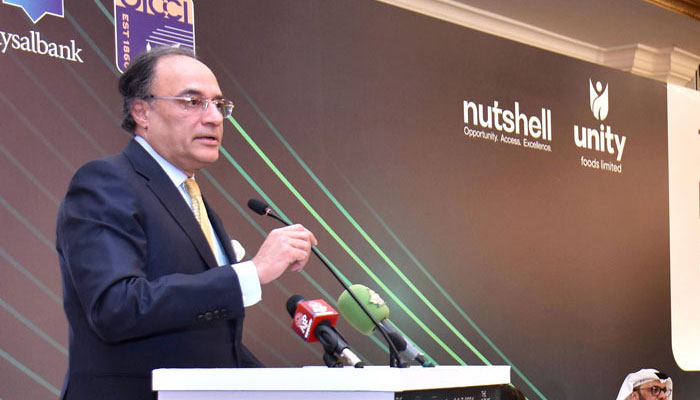Credibility gap mars Pakistan’s ties with IMF: Aurangzeb
Minister says IMF would be visiting Islamabad for stocktaking of the existing situation
ISLAMABAD: Federal Finance Minister Muhammad Aurangzeb said Friday Pakistan faced trust and credibility gap in eyes of the IMF because what was uttered and committed, was not implemented fully.
The IMF, he said, would be visiting Islamabad for stocktaking of the existing situation. He said that the government fetched the desired revenues from retailers and wholesalers envisaged for the first quarter (July-September) period of the current fiscal year. The minister said the IMF endorsed the electricity winter package as nothing of this sort was done without approval of the Fund. The minister said that the structural benchmark and other quotative targets were signed but never fallen through with the IMF, he maintained.
“The government cannot run PIA so it will again try to privatised i. The button of privatisation will be switched on again,” Minister for Finance and Revenues Muhammad Aurangzeb said while talking to reporters after participating in a session during Islamabad Literature Festival organized by Oxford University Press here on Friday night. This session was moderated by economist Dr Vaqar Ahmed.
It is yet to see how the IMF will respond to government’s claim that the retailers/wholesalers deposited tax revenues of Rs10 billion during the first quarter but the retailers under Tajir Dost Scheme (TDS) paid just peanuts. In the budget for 2024-25, the FBR increased the tax liabilities for wholesalers and distributors under income tax obligation in case of selling products to non-filers and the rate was jacked up ten times. It forced wholesalers, retailers to pay increased amount of Rs7 to Rs10 billion. Will the IMF accept it as tax payment under TDS is not yet known, said the sources. He said that all the four provincial cabinets granted their nod for implementing Agri Income Tax and it would be in place from January 1, 2025 but collection would kickstart from next fiscal year.
The minister said that he did not buy this argument that the real estate resulted into boosting up 40 industries. He said that the government would have to bring real estate, retailers and agriculture income into tax net because saturation point had already touched for getting maximum tax rates from salaried and manufacturers in the range of 45 to 50 percent. Can we further jack it up to 60 percent? The answer lies only in expanding the narrowed tax base and then rationalise tax rates for all others, he added. He said he had paid income tax as salaried person which would be made public under declaration of assets and income as parliamentarians.
However, Minister for Finance Muhammad Aurangzeb said that the era of dole-outs in shape of foreign deposits from friendly countries including China, Saudi Arabia, UAE, Qatar and others was over.
The minister said that the retailers and wholesalers deposited increased tax under their obligation and detailed data would be shared with the IMF and now Pakistan would have to come up with bankable and viable projects to attract foreign direct investments.
He said that the policy of increased reliance on imports could not help achieving sustainable growth as the country plunged into balance of payment crisis whenever the country’s GDP growth exceeded by 4 percent of GDP. The Foreign Direct Investment (FDI), he said, would be attracted to boost up exports. The export led growth, he said, was the only way forward to make sustainable progress.
-
 Costco $20 Rule Explained As Employee Pay Climbs Across North America
Costco $20 Rule Explained As Employee Pay Climbs Across North America -
 Strange Incident Happened At Nancy Guthrie's Home On Abduction's 10th Day
Strange Incident Happened At Nancy Guthrie's Home On Abduction's 10th Day -
 Tumbler Ridge School Lockdown Underway As RCMP Investigate School Shooting
Tumbler Ridge School Lockdown Underway As RCMP Investigate School Shooting -
 Britney Spears Quietly Parts Ways With Her Music Catalog: Report
Britney Spears Quietly Parts Ways With Her Music Catalog: Report -
 Princess Diana Bodyguard Suspected ‘she Could Die’: Here’s How
Princess Diana Bodyguard Suspected ‘she Could Die’: Here’s How -
 King Charles Makes It ‘absolutely Clear’ He Wants To Solve Royal Crisis
King Charles Makes It ‘absolutely Clear’ He Wants To Solve Royal Crisis -
 Royal Family Warned To ‘have Answers’ Amid Weak Standing
Royal Family Warned To ‘have Answers’ Amid Weak Standing -
 Marc Anthony On Why Bad Bunny’s Super Bowl Show Mattered
Marc Anthony On Why Bad Bunny’s Super Bowl Show Mattered -
 Kid Rock Gets Honest About Bad Bunny’s Performance At Super Bowl
Kid Rock Gets Honest About Bad Bunny’s Performance At Super Bowl -
 Kylie Jenner Reveals Real Story Behind Her 'The Moment' Casting
Kylie Jenner Reveals Real Story Behind Her 'The Moment' Casting -
 Jaafar Jackson Breaks Silence On Becoming Michael Jackson
Jaafar Jackson Breaks Silence On Becoming Michael Jackson -
 Eva Mendes Reveals One Costar She Envied Ryan Gosling Over
Eva Mendes Reveals One Costar She Envied Ryan Gosling Over -
 Halsey Marks Fiancé Avan Jogia's Birthday With Emotional Note
Halsey Marks Fiancé Avan Jogia's Birthday With Emotional Note -
 China: Stunning Drone Show Lights Up Night Sky Ahead Of Spring Festival 2026
China: Stunning Drone Show Lights Up Night Sky Ahead Of Spring Festival 2026 -
 Andrew's Epstein Scandal: Will King Charles Abdicate Following King Edward's Footsteps?
Andrew's Epstein Scandal: Will King Charles Abdicate Following King Edward's Footsteps? -
 Billy Joel Leaves Loved Ones Worried With His 'dangerous' Comeback
Billy Joel Leaves Loved Ones Worried With His 'dangerous' Comeback




